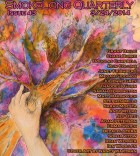Can you tell us a little bit about the narrative of this story? Where did it start for you, and how did it change and adjust as you returned to it and worked on it?
Most of the layers of this piece fell into place after I decided that I wanted to write about a girl selling her virginity online. I thought it might be interesting to write it from the perspective of the girl’s younger sister, because a younger sister would probably count the older sister as a role model. Then I decided to include some backstory on the way these two girls have been treated by men, namely their father, to complicate their relationship. The narrator is wistful and envious of her sister, and she feels very alone. To expand upon that, I decided to make her not a virgin, and decided that she’d been snubbed by the boy she lost her virginity to. I wanted to create a character that thinks she has absolutely nothing as compared to her sister, and who is completely unaware that her sister is just as damaged as she is.
It sounds like your writing process includes a fair bit of forward venturing and then careful reconsideration, editing, and addition of context that would deepen a character’s presence. Does that sound right? How do the limits or constraints of compressed narratives—like those we find in Smokelong—help or trouble this process?
That pretty much sums it up! I think that shorter fiction actually helps this process because in writing it you’re forced to focus on the power of every word and sentence. Every message you want to get across has to be conveyed in just a few sentences or less. Writing flash fiction forces you to get your point across faster and in fewer words, which is a great challenge.
Speaking of challenges, is there a point of view more challenging than one that employs second-person? For you, what are some of the rewards of this point of view choice?
Working in second-person seems to always either really work for a story or fall completely flat, and sometimes it can be hard to tell if it’s working or not. The best part about working in second-person, though, is that it allows you to create a story that feels very confessional and personal. Writing this story as a direct address to the older sister felt natural and honest, and it seemed therapeutic that this narrator would tell this story to her sister first. Second-person assumes empathy of the readership.
“What You Sold Online” is in some ways a family story, and in some ways it’s a coming-of-age tale, and in some ways it’s a cultural critique. Can you talk a little bit about which of these you feel best defines the story, and talk a little bit about why that’s important to you as an artist and writer and person?
Ultimately, I’d say this is a story about a girl who has a very skewed perception of her own worth, and I think that’s a cultural critique first and foremost. The narrator believes that her worth is directly correlated to the amount of attention she receives from men. When she doesn’t receive enough attention from men, she wonders if men would have wanted to pay money to sleep with her, and thinks that she’s lost even her monetary value because she lost her virginity to someone she cared about. She feels like she wasted an opportunity.
I hoped to create a piece that would illustrate the ways in which our culture instructs girls to seek validation through the attention of men, and how lonely and damaging that can be for a teenage
girl.
Who are some of the writers you feel are doing the best work in illustrating, as you say it, “the ways in which our culture instructs girls to seek validation through the attention of men” today, and can you tell us what you admire most about them?
I really appreciate all mediums of art that focus on empowering women and create strong female role models. There’s a lot of great TV writing that accomplishes this: Tina Fey and Mindy Kaling, for example, are incredible. I also really like the writing—both articles and fiction—in Tavi Gevinson’s Rookie, and I’m a fan of Jennifer Egan as well.
Tell us where you are in your writing and professional life today, and what projects—writing and otherwise—are you most excited about in your future. You’ve mentioned you work for the THON program; how does this sort of project and service influence and shape your writing today and into the future?
I’m currently pursuing a bachelor’s degree in English as well as a master’s degree in English with a focus in creative writing, and I love my school’s writing program, so this is an exciting time for me! I’m looking forward to learning as much as I can before I graduate and improving my writing. Through volunteering, I’ve learned a lot about myself and about human nature in general. I think I’ve learned what it really means to give yourself and everything you have to another person through volunteering, and that has been invaluable to me both as a person and as a writer. I think that experiences that make you a better person inevitably make you smarter as well.



 The SmokeLong Grand Micro Contest (The Mikey) is now an annual competition celebrating and compensating the best micro fiction and nonfiction online.
The SmokeLong Grand Micro Contest (The Mikey) is now an annual competition celebrating and compensating the best micro fiction and nonfiction online.